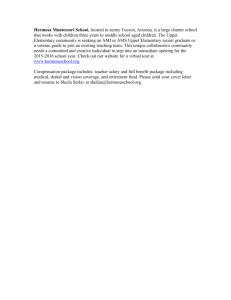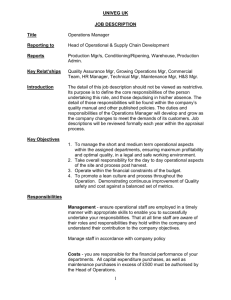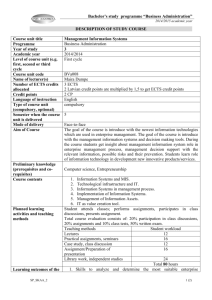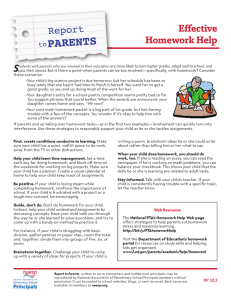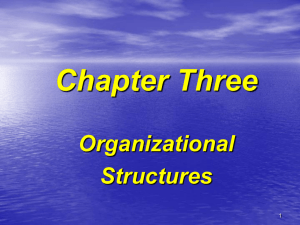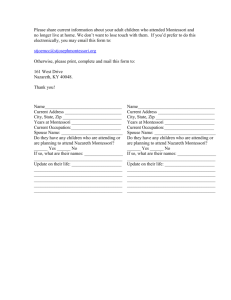Jesuit University Ignatianum in krakow LEARNING MODULE
advertisement
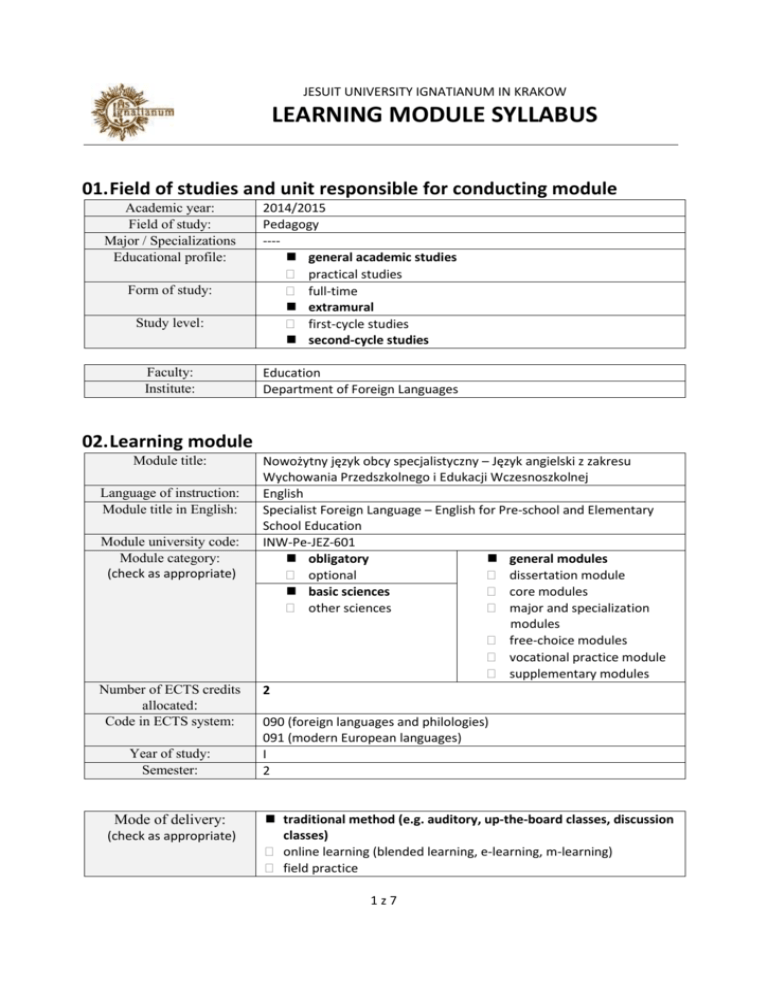
JESUIT UNIVERSITY IGNATIANUM IN KRAKOW LEARNING MODULE SYLLABUS 01. Field of studies and unit responsible for conducting module Academic year: Field of study: Major / Specializations Educational profile: Form of study: Study level: Faculty: Institute: 2014/2015 Pedagogy --- general academic studies practical studies full-time extramural first-cycle studies second-cycle studies Education Department of Foreign Languages 02. Learning module Module title: Language of instruction: Module title in English: Module university code: Module category: (check as appropriate) Number of ECTS credits allocated: Code in ECTS system: Year of study: Semester: Mode of delivery: (check as appropriate) Nowożytny język obcy specjalistyczny – Język angielski z zakresu Wychowania Przedszkolnego i Edukacji Wczesnoszkolnej English Specialist Foreign Language – English for Pre-school and Elementary School Education INW-Pe-JEZ-601 obligatory general modules optional dissertation module basic sciences core modules other sciences major and specialization modules free-choice modules vocational practice module supplementary modules 2 090 (foreign languages and philologies) 091 (modern European languages) I 2 traditional method (e.g. auditory, up-the-board classes, discussion classes) online learning (blended learning, e-learning, m-learning) field practice 1z7 03. Module coordinator and course teachers mgr Joanna Zubel joannazubel@gmail.com Module coordinator (responsible for the module specification sheet) Lecture: Module teachers: Classes: Kłyś Barbara, mgr b.klys@poczta.onet.pl Koper, Elżbieta, mgr carmina321@yahoo.pl Ozga Krzysztof, dr kozga@poczta.fm Pałka Ewa, mgr ewapalka@vp.pl Pelczar Izabela, mgr izapelczar1@o2.pl Płaneta Magdalena, mgr mplaneta@v-lo.krakow.pl Rene Iweta, mgr iweta_rene@yahoo.com Traciewicz Bożena, mgr botracie@wp.pl Troszczyński Łukasz, mgr lukas.martin74@gmail.com Zagórny Grażyna, mgr gzagorny@poczta.fm Zubel Joanna, mgr joannazubel@gmail.com 04. Calculation of credits in terms of workload Type of classes: Lecture (L) Classes, foreign language classes (C) Proseminar (PS) Seminar (S) Practical classes (workshops, training, computer laboratory, practice) (P) Total: Number of contact hours 18 (a) Number of consulting hours (b): Total number of contact hours (c = a + b): Number of hours of independent learning (d): Total number of hours (e = c + d): Contact hours / total number of hours percentage ratio (f = c/e * 100 [%]): Total number of ECTS credits for the module: (Note: 1 ECTS can be allocated for 25h hours of work of a typical student) 18 1 19 31 50 38% 2 05. Detailed description of ECTS credits allocation (distribution of ECTS credits) Form of activity Contact hours with academic teacher, including: -lecture attendance -classes, tutorials, seminars, laboratories attendance -consulting hours (of ‘typical’ student with teacher) Student independent work (hours without direct teacher’s guidance), including: 2z7 Typical number of hours for the activity 19 18 1 31 -preparation before classes (including reading set literature) -studying for control tests -studying for the written/oral exam -preparation of report -preparation of presentation -preparation of discussion -preparation of essay -preparation of written or oral project (other than mentioned above) -other than mentioned above (please specify) ………………………………………………. Total number of contact hours and hours of student independent work: 18 5 6 2 50 06. Learning module / academic course description Brief module / course description: Course summary: The aim of the course is to familiarise students with the target language terminology within the scope of pre-school and elementary school. Students also practise the ability to find information in the target language materials. During the course students develop language skills (listening, reading, writing, and speaking in English) at B2+ level (according to the Common European Framework) for professional and academic applications. 07. Prerequisites Introductory modules: Other requirements: Not required Knowledge of English at B2 level proved by a certificate or an exam at B2 level taken during the first cycle. 08. Learning outcomes Knowledge: LO1: Knows English terminology related to pre-school and elementary school education, with a focus on the areas listed in Teaching Contents (T01T03 and T6-T11). LO2: Can characterize the rules of organisation and composition of a CV and a covering letter. Skills: LO3: Can understand standard speech spoken at a normal rate and follow even complex lines of argument provided the topic is reasonably familiar. Can understand the educational programmes within the area of his/her study. LO4: Can understand the main ideas of complex text on both concrete and abstract topics, including technical discussions in his/her field of specialisation. LO5: Can interact with a degree of fluency and spontaneity that makes regular interaction with native speakers quite possible. Is able to take an active part in discussion in familiar contexts and can account for and sustain 3z7 views clearly by providing relevant explanations and arguments. LO6: Can give clear‚ detailed descriptions and presentations on complex subjects‚ integrating sub-themes‚ developing particular points and rounding off with an appropriate conclusion. LO7: Can present clear, detailed descriptions on a wide range of subjects related to their field of interest, expanding and supporting ideas with subsidiary points and relevant examples. They can explain a viewpoint on a topical issue giving the advantages and disadvantages of various options. LO8: Possesses writing skills essential for typical English composition works, characteristic for the faculty studied, concerning detailed issues, using basic theoretical approaches as well as variety of sources. LO9: Possesses the ability to prepare public speeches in English in the fields of study characteristic for the faculty studied, concerning detailed issues, using basic theoretical approaches as well as variety of sources. Social competences (attitudes): LO10: Understands the need of lifelong learning. LO11: Can cooperate and work in a team by assuming different roles. LO12: Is ready to develop and enhance his/her knowledge. 09. Teaching contents (curriculum) No. T01 T02 T03 T04 T05 T06 T07 T08 T09 T10 T11 T12 Course contents and corresponding type of classes Detailed description of subject areas Learning styles and multiple intelligences. Educational systems in Poland and English-speaking countries. The Montessori method. Successful presentations – guidelines. CV and covering letter writing. Verbal and non-verbal communication. Development of pre-school and elementary school children. Learning difficulties in pre-school and elementary school children. Class management. Creative methods in teaching children. Students’ presentations covering areas of their choice within the scope of preschool and elementary school education. Final test. 10. Teaching methods and aids Teaching methods: TM01: short chat TM02: use of story 4z7 Number of hours L C PS 1 2 1 1 1 1 1,5 1,5 1 1 5 1 S L P TM03: description TM04: talk TM05: use of anecdote TM06: lecture-related discussion TM07: brainstorming TM08: explanation TM09: demonstration TM10: educational film TM11: demonstration and explanation TM12: text analysis followed by discussion TM13: snowball sampling TM14: guided text method Teaching aids: TA01: coursebooks TA02: printed texts (magazines, press) TA03: electronic texts (portals, vertical portals, blogs) TA04: images TA05: charts TA06: maps TA07: screen TA08: overhead projector TA09: CD-player TA10: laptop TA11: sound recording TA12: film TA13: multimedia presentation 11. Assessment methods and criteria for the completion of the module Award of credit: (check as appropriate) Partial grades (constituent grades): Calculation of final grade on the basis of partial grades (final grade): final grade signature without grade Lexical test, written assignments, active participation in classes, presentation. Weighted average of partial grades. Students are obliged to attend classes. Two absences in a semester are allowed. If a student misses more than 50% of classes in a semester, they fail the semester. Final grade criteria Lack of basic skills listed in the learning outcomes, or missing more than 50% For 2.0 classes in a semester. For 3.0 The student has scored at least 60% of all possible points for all graded tasks. For 3.5 The student has scored at least 68% of all possible points for all graded tasks. For 4.0 The student has scored at least 75% of all possible points for all graded tasks. For 4.5 The student has scored at least 83% of all possible points for all graded tasks. For 5.0 The student has scored at least 90% of all possible points for all graded tasks. 5z7 12. Matrix of module and programme learning outcomes Reference of module learning outcomes to detailed learning outcomes defined for the field of study (programme learning outcomes) The extent to which module learning outcome participates in the programme learning outcomes defined for the field of study. LO1 K2_W01 +++ LO2 LO3 K2_U03 K2_U01 + + LO4 K2_U01 + LO5 K2_U04 ++ LO6 K2_U04 ++ K2_U05 ++ K2_U04 K2_U01 K2_K01 ++ ++ +++ K2_U12 +++ K2_K01 +++ Module learning outcome LO7 LO8 LO9 LO10 LO11 LO12 Learning assessment method (to be completed on the basis of paragraph 11: “Assessment methods and criteria for the completion of the module”). Lexical test, written assignments, active participation in classes, presentation. Written assignments Lexical test, active participation in classes, presentation. Lexical test, written assignments, active participation in classes, presentation. Active participation in classes, presentation. Written assignments, active participation in classes, presentation. Written assignments, active participation in classes, presentation. Written assignments Presentation Active participation in classes Active participation in classes, presentation. Active participation in classes. 13. Reference books Required reading: Virginia Evans, Successful Writing Upper-Intermediate, Express Publishing, 1998 Marion Grussendorf, English for Presentations, Oxford University Press, 2007 http://www.schoolfamily.com/school-family-articles/article/826-what-is-your-childslearning-style http://www.bgfl.org http://www.edutopia.org/multiple-intelligences-howard-gardner-video http://www.eurydice.org.pl http://www.victoria.ac.nz/st_services/careers/resources/career_publications/career_ess entials/cvs_and_cover_letters_for_new_teachers.pdf 6z7 http://www.greatsampleresume.com/Job-Responsibilities/Primary-School-TeacherResponsibilities.html http://www.youtube.com (Present like Steve Jobs, A few years in Montessori, and all I got was…, Elementary Montessori, Montessori 6-9 Multiplication, Montessori Elementary Language Lesson) http://montessoritraining.blogspot.com/2007/11/prepared-montessori-environmentteacher.html http://montessoritraining.blogspot.com/2009/03/principles-of-montessoriprepared.html http://www.casamontessori.com/montessori.htm http://www.brainyquote.com/quotes/authors/m/maria_montessori.html http://en.wikipedia.org/wiki/Child_development_stages http://www.ces.ncsu.edu/depts/fcs/pdfs/fcs465.pdf http://www.rsd.k12.pa.us/Downloads/Development_Chart_for_Booklet.pdf http://www.helpguide.org/mental/eq6_nonverbal_communication.htm http://nonverbal.ucsc.edu/ http://www.educationworld.com/a_curr/curr155.shtml http://www.britishcouncil.org/languageassistant/pdf/Unit2.pdf http://www.edutopia.org/blog/creativity-in-classroom-trisha-riche http://www.helpguide.org/mental/learning_disabilities.htm Recomm ended reading: Martin Hewings, Cambridge Academic English. An Integrated Skills Course for EAP, Cambridge University Press, 2012. The approval of the module specification sheet Krakow, (place, date) (module coordinator signature) dean’s signature Approved for execution Date and signatures of all teachers responsible for module in academic year 7z7
